Samourai Wallet
Privacy advocates in the crypto world have been closely watching the Samourai Wallet case [I56, 57, 83, 84, 90], with many comparing it to the highly controversial prosecution of Tornado Cash founder Roman Storm [Tornado]. The Samourai Wallet founders, who pleaded guilty to one count of conspiracy to operate an unlicensed money transmitting business in exchange for prosecutors dropping the more severe money laundering conspiracy charge, have maintained that they were merely developing privacy-preserving software, and that they were not responsible for criminal use of the software. Prosecutors have argued that the developers actively intended the software to be used for criminal purposes, pointing to marketing aimed at “Dark/Grey Market participants” and those engaged in “Illicit activity”.
Prosecutors have sought a five-year sentence for the two founders — the statutory maximum for the charge — and Keonne Rodriguez received that full sentence, plus a $250,000 fine. Rodriguez has already paid $6.3 million in forfeiture. Judge Cote cited a letter to the court in which Rodriguez continued to say that he was merely motivated by a desire to protect financial privacy and not “a desire to facilitate criminal activity” as evidence that Rodriguez “has not come to terms with what he did. ... The letter indicated to me that you were very much still operating in a world with moral blinders on.”6 William Lonergan Hill, Rodriguez’s cofounder, will be sentenced later this m
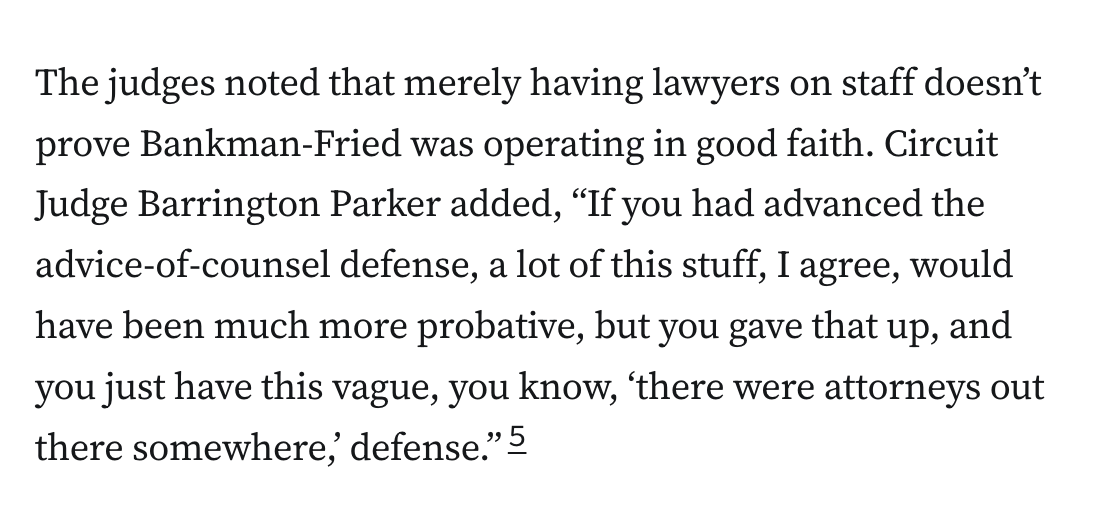
![Addressing the solvency claims, the judges reminded Bankman-Fried’s defense team that a crime is not absolved simply because victims are ultimately made whole. A government prosecutor argued that the evidence against Bankman-Fried was conclusive, and that several of his fellow executives testified that he knowingly misappropriated customer funds to use on investments or political expenditures. And a recent Supreme Court case closed off one of Bankman-Fried’s avenues of argument around intent, with an opinion in Kousisis v. United States earlier this year ruling that a person who fraudulently induces a victim into a transaction can still be convicted of fraud even if they didn’t intend to cause the victim to lose money.34
On the topic of legal advice, the judges questioned why Bankman-Fried opted not to bring an advice-of-counsel defense during the trial if they wished to claim Bankman-Fried was operating in good faith but led astray by bad legal advice. As I wrote shortly before the trial, there was likely a reason he didn’t opt to formally advance this defense:
[T]hey've stopped short of bringing a formal advice-of-counsel defense, which would require them to show that Bankman-Fried gave his lawyers a full understanding of what he intended to do, then dutifully followed their advice in doing it. This is typically a tricky defense to pull off, and his team may have decided against pursuing it due to concerns that those lawyers could respond by sharing documents that further](https://media.hachyderm.io/media_attachments/files/115/510/050/223/383/875/original/7045dfc2dd43b937.png)
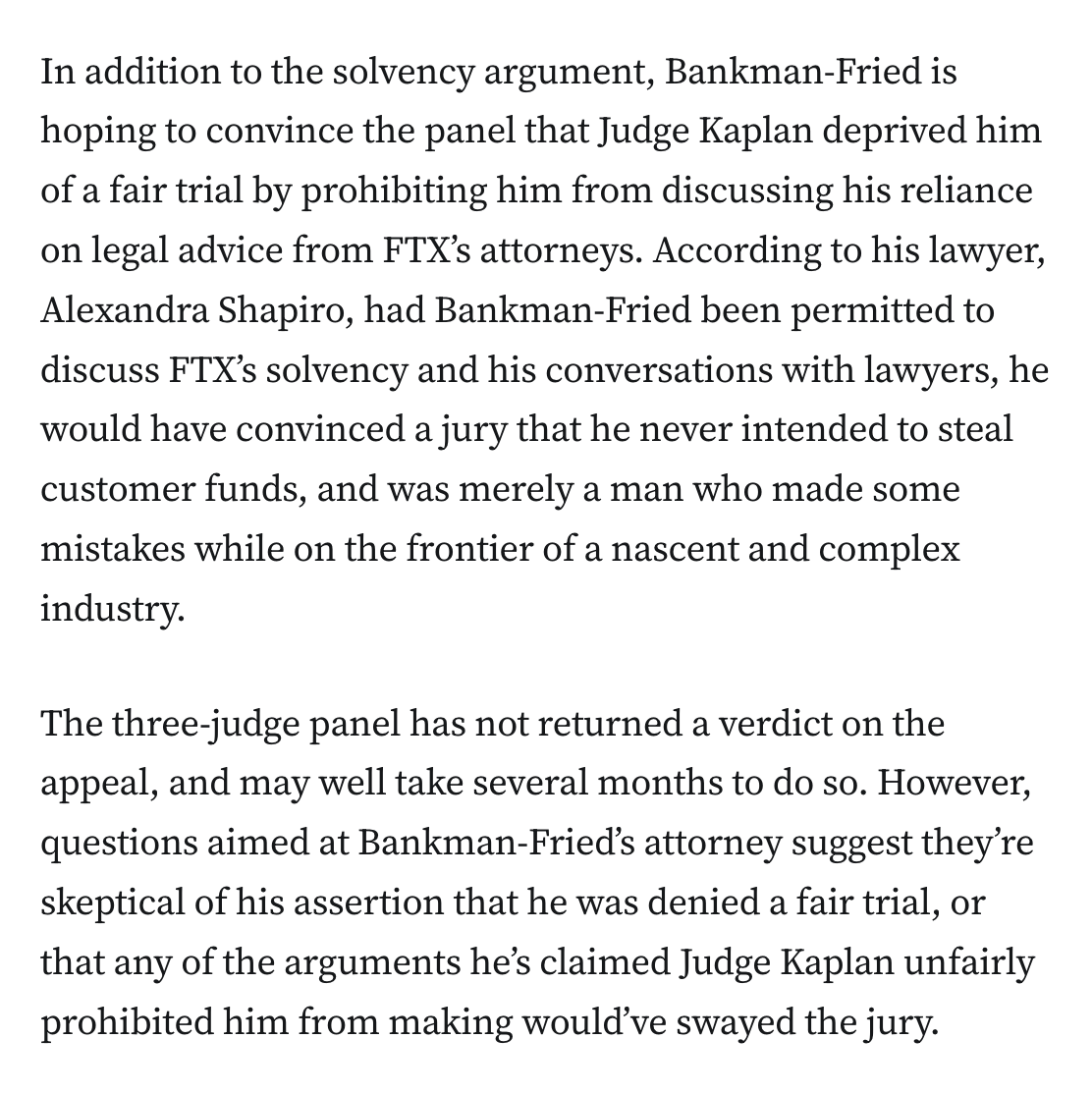
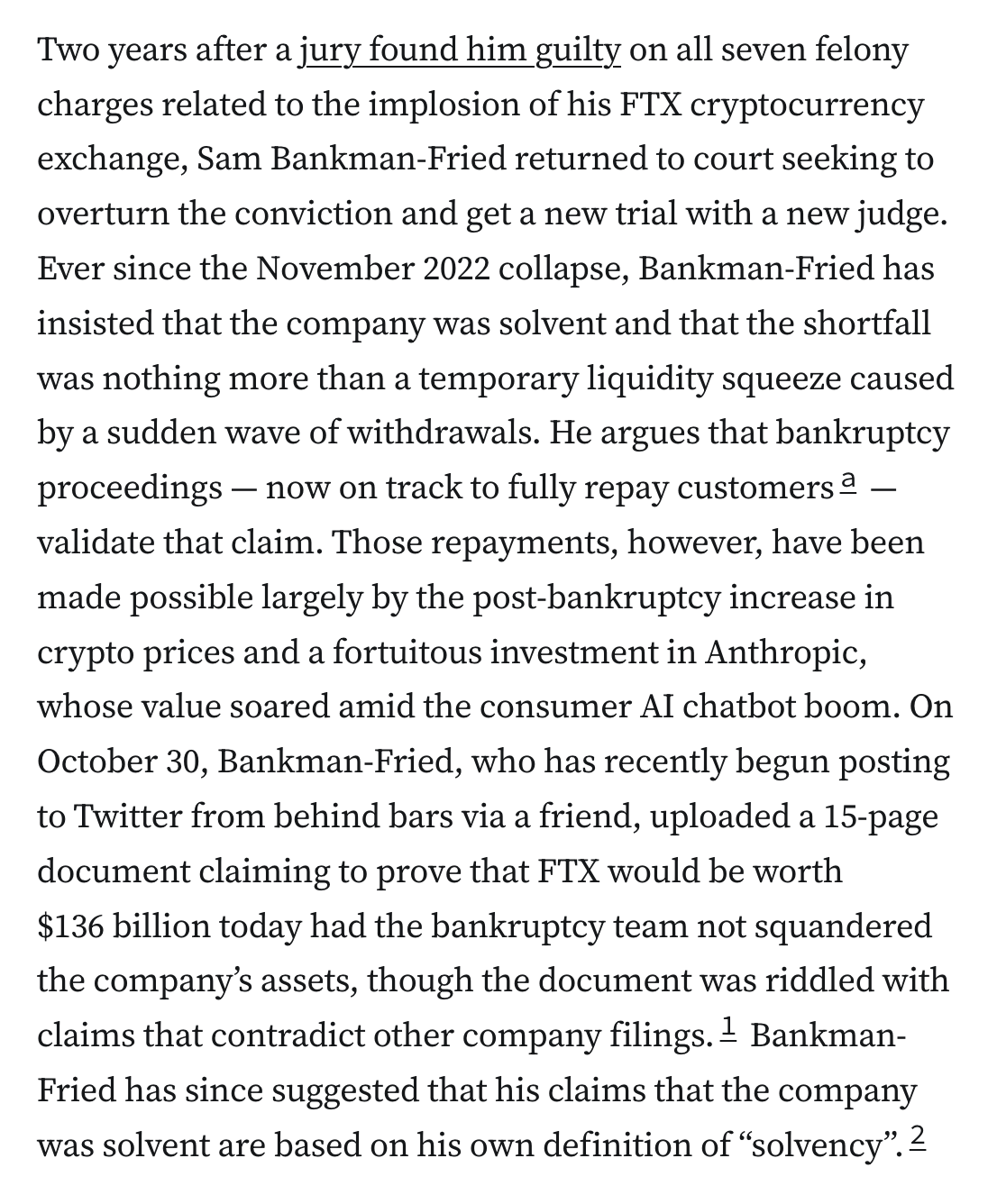
![Samourai Wallet
Privacy advocates in the crypto world have been closely watching the Samourai Wallet case [I56, 57, 83, 84, 90], with many comparing it to the highly controversial prosecution of Tornado Cash founder Roman Storm [Tornado]. The Samourai Wallet founders, who pleaded guilty to one count of conspiracy to operate an unlicensed money transmitting business in exchange for prosecutors dropping the more severe money laundering conspiracy charge, have maintained that they were merely developing privacy-preserving software, and that they were not responsible for criminal use of the software. Prosecutors have argued that the developers actively intended the software to be used for criminal purposes, pointing to marketing aimed at “Dark/Grey Market participants” and those engaged in “Illicit activity”.
Prosecutors have sought a five-year sentence for the two founders — the statutory maximum for the charge — and Keonne Rodriguez received that full sentence, plus a $250,000 fine. Rodriguez has already paid $6.3 million in forfeiture. Judge Cote cited a letter to the court in which Rodriguez continued to say that he was merely motivated by a desire to protect financial privacy and not “a desire to facilitate criminal activity” as evidence that Rodriguez “has not come to terms with what he did. ... The letter indicated to me that you were very much still operating in a world with moral blinders on.”6 William Lonergan Hill, Rodriguez’s cofounder, will be sentenced later this m](https://media.hachyderm.io/media_attachments/files/115/510/053/799/659/237/original/da0db76dda1b6fd5.png)
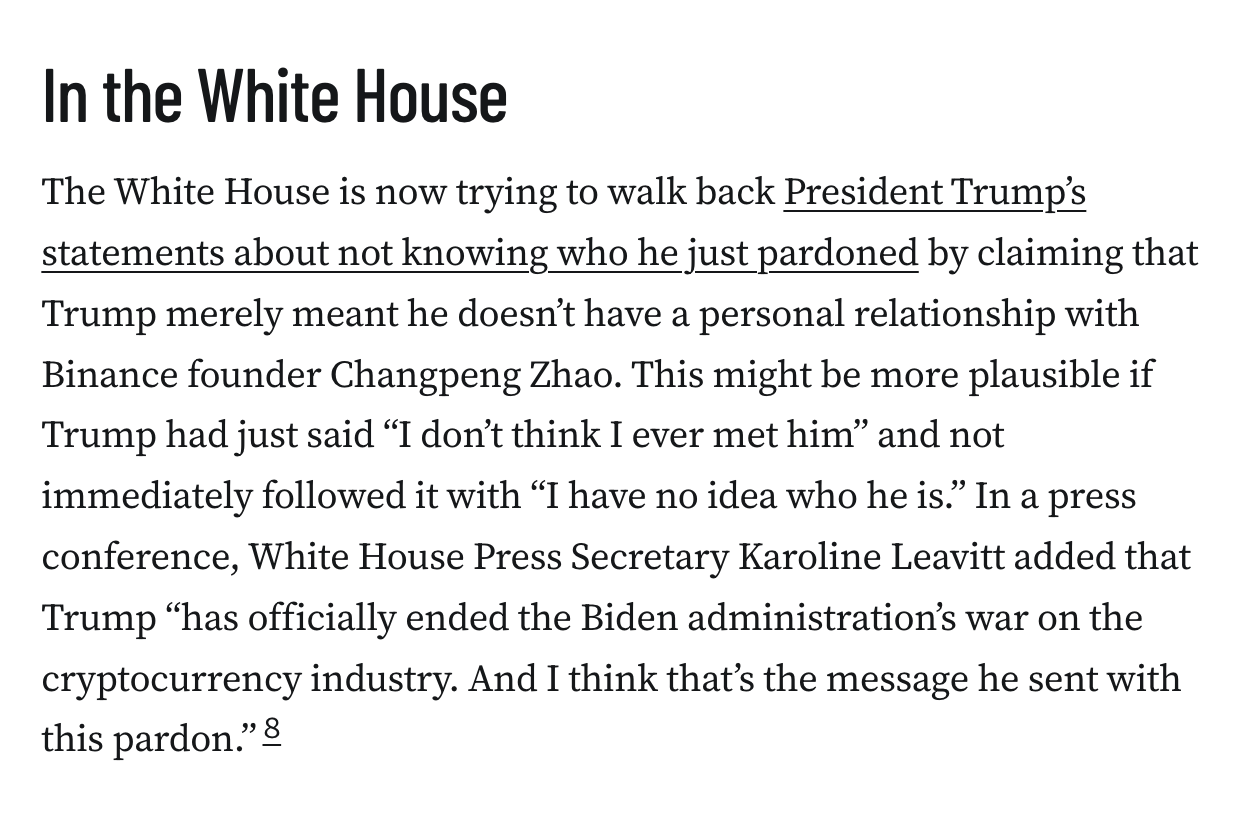
![In regulators
Custodia Bank has lost its appeal of a 2024 court ruling that found that the firm was not entitled to a Federal Reserve master account. In the original decision, Judge Scott Skavdahl opined, “If Custodia’s position was correct, it would effectively mean that every depository institution chartered under the laws of a state, regardless of how soundly crafted, is entitled to a master account allowing it direct access to the federal financial system.” [I54]. This decision was affirmed in a 2–1 opinion in the Tenth Circuit, which concluded, “the plain language of the relevant statutes grants Federal Reserve Banks discretion to reject master account access requests from eligible entities and, therefore, we reject Custodia’s attempt to impair the Fed’s ability to safeguard our nation’s financial system through the exercise of discretion to reject master account access.”9 Custodia has nevertheless celebrated that one judge disagreed with the conclusion, and has claimed that there is a circuit split that could qualify them for rehearing.10](https://media.hachyderm.io/media_attachments/files/115/510/057/942/781/010/original/620a8e3bb9eceb41.png)
![Coinbase’s Chief Legal Officer, Paul Grewal, was furious at the ICBA’s submission, writing on Twitter, “Imagine opposing a regulated trust charter because you prefer crypto to stay … unregulated. That’s ICBA’s position. It’s another case of bank lobbyists trying to dig regulatory moats to protect their own. From undoing a law to go after rewards to blocking charters, protectionism isn’t consumer protection.”14 His statement was met with mixed responses, with some agreeing with his claim that traditional banks were seeking to exclude competitors. Others were more skeptical. “Imagine approving an application that fails to meet statutory chartering standards so that your latest DeFi scamcoin has some air of legitimacy,” replied one commenter.15 “Says the co[mpany] encouraging clients to take on 10x-50x leverage. ‘Trust me, bro.’” wrote another.16](https://media.hachyderm.io/media_attachments/files/115/510/062/013/103/808/original/ddbb391557294d3f.png)
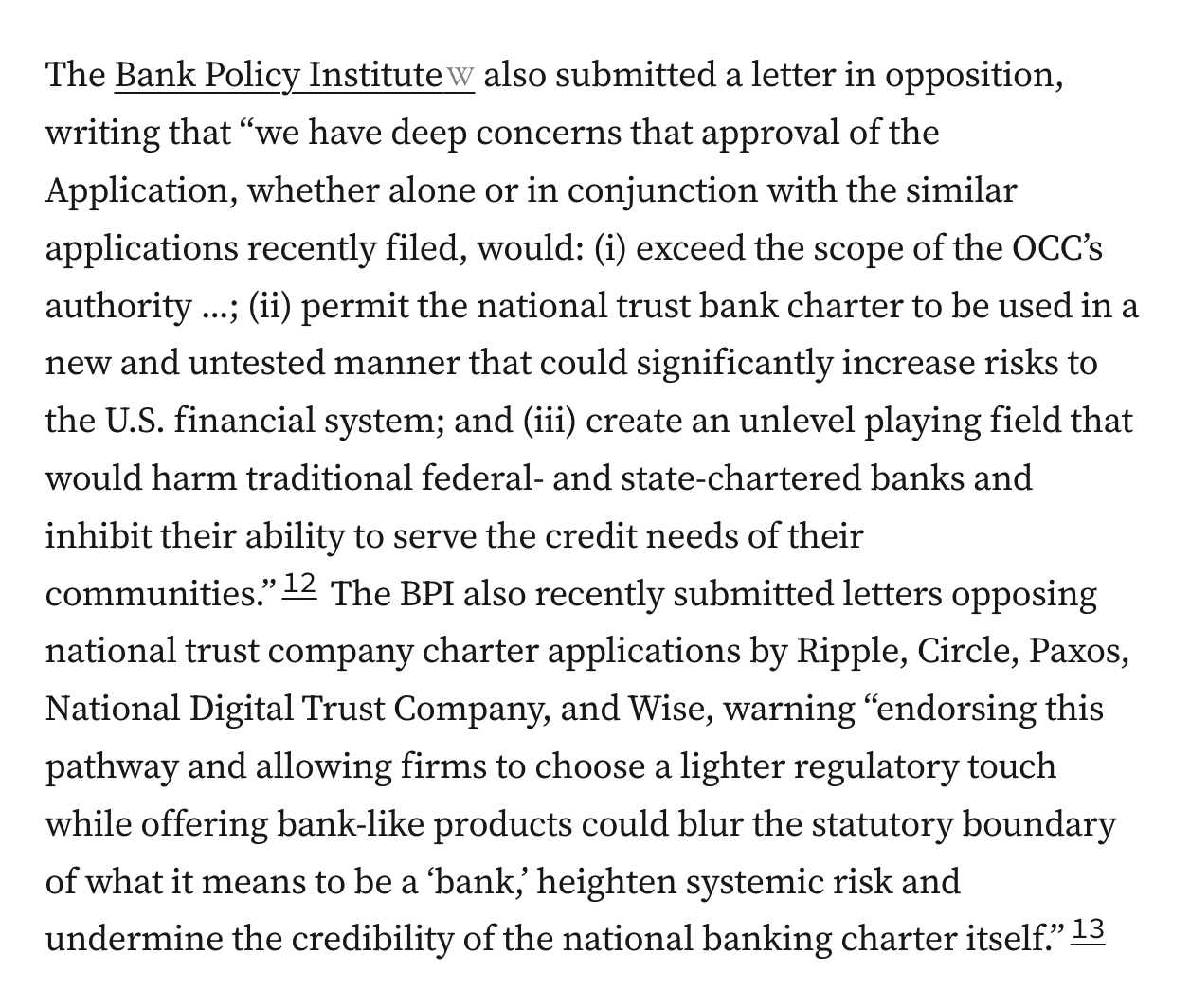
![Meanwhile, Coinbase is facing some opposition from banks over its application for a national trust bank charter [I95]. The Independent Community Bankers of America, the main trade group for community banks, submitted a letter to the Office of the Comptroller of the Currency expressing their position that the Coinbase National Trust Company has “demonstrably flawed risk and control functions while operating under a governance structure that prevents independent oversight” and “would struggle to achieve and maintain profitability during crypto bear markets, the very time at which the similarly concentrated Coinbase would be least able to provide support”. They also write that “The OCC’s untested receivership framework would struggle to resolve an uninsured institution of CNTC’s proposed scale and operational complexity, particularly given the technical challenges of crypto custody and CNTC’s likely importance as a dominant crypto ETF custodian.” The letter cites multiple recent enforcement actions by US and UK regulators against the Coinbase and the company’s May 2025 disclosure of a major cybersecurity breach [I84] as evidence of “a continuous pattern of compliance and operational failures. Indeed, over the past five years, Coinbase has never had a year without being subject to an enforcement action, spanning multiple jurisdictions (US, UK) and regulatory domains (BSA/AML, licensing, market integrity).” (Another enforcement action against Coinbase in Ireland, which I will desc](https://media.hachyderm.io/media_attachments/files/115/510/059/896/011/437/original/414b157655c07fce.png)
![The Central Bank of Ireland has fined Coinbase €21.5 million (~$24.9 million) for failures in its anti-money laundering and counterterrorism transaction monitoring programs from 2021 to 2025.
Coinbase Europe has been fined due to faults in the configuration of their transaction monitoring system, which resulted in more than 30 million transactions not being properly monitored over a 12-month period. The value of these transactions amounted to over €176 billion, and accounted for approximately 31% of all Coinbase Europe transactions conducted in the period when the faults existed. Further, it took Coinbase Europe almost three years to fully complete the monitoring of the impacted transactions. This subsequent monitoring led to the reporting of 2,708 [Suspicious Transaction Report]s to the FIU for further analysis and potential investigation. The STRs submitted in respect of the late monitoring of the transactions contained suspicions associated with serious criminal activities including: money laundering; fraud/scams; drug trafficking; cyber-attacks (malware/ransomware); and child sexual exploitation.
Coinbase Europe had outsourced its transaction monitoring to Coinbase Inc., its American counterpart.17](https://media.hachyderm.io/media_attachments/files/115/510/065/177/820/024/original/527f82a8e5096f02.png)